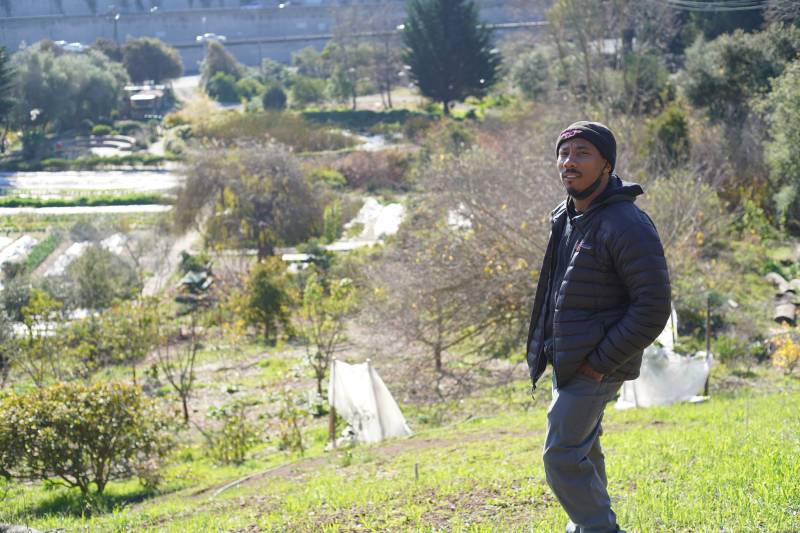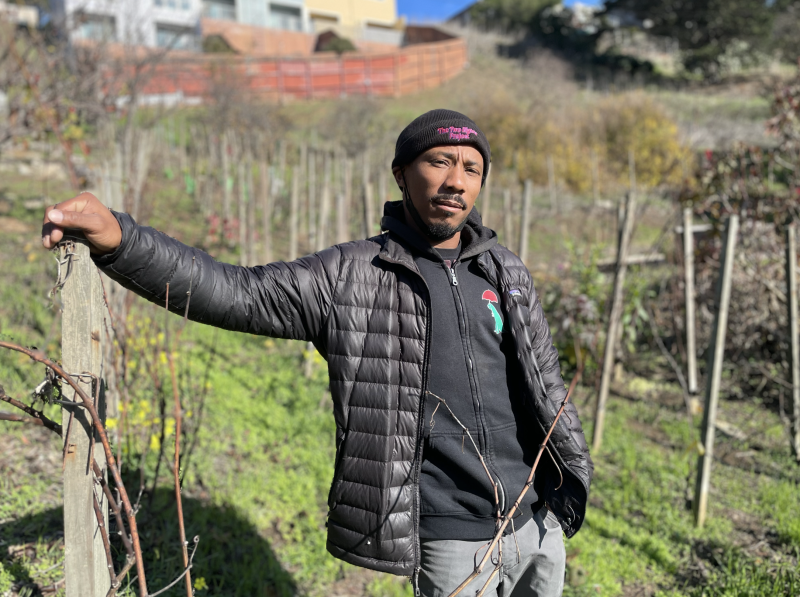On a steep hillside in San Francisco’s St. Mary’s Park, nestled between the Alemany Apartments, the 280 Freeway and the Bernal Heights Neighborhood, there’s a wine vineyard that doubles as a teaching tool.
A patch of land adjacent to Alemany Farm is being cultivated by Christopher Renfro and Jannea Tschirch, the co-founders of The 280 Project.
Their aim is to use public land to grow crops and introduce people to the world of agriculture, with a specific focus on getting young African-American residents of San Francisco interested in viticulture.
On a chilly day in the dead of winter, the Rightnowish team got a tour of the farm, the vineyard and the view from the hillside.
This week we bring you a story that exemplifies a unique way to use public land– as a classroom and potential career pathway.

Below are lightly edited excerpts of my conversation with Christopher Renfro.
PENDARVIS HARSHAW: I read that each row [in the vineyard] has a specific name. What are the names of the rows and what are the significance of the names?
CHRISTOPHER RENFRO: Yeah. So first row is Carver, George Washington Carver. Then the second is the MLK row… Harriet Tubman, and then you have Huey P. So, Huey Newton of the Black Panthers. Each one of these people, I feel like, is a significant figure in Black history and should not be forgotten but each one of them had ties to the land. They all had ties to freedom, especially around the land.
HARSHAW: Inspired by these icons, Christopher’s goal with this small vineyard is to empower Black people by showing folks the benefits of being tapped into the land.
It’s less about commercial wine production and more about serving as an educational hub for folks of color– specifically, the young Black children from the neighboring housing complex.These vines are a tool to assist people in reconnecting with the land and learning agricultural skills that can open up doors for employment and entrepreneurial opportunities.
RENFRO: I think there is a lot of opportunity and if we look at this industry as a whole, we don’t see a lot of Black folks in it. The way I got to this was I worked in restaurants and I wanted to get further in the wine industry. I already have a horticulture background but Napa always seemed so far away. Napa seems so far and it seems so white. And I was just like, I don’t know if I’ll ever be able to get there. So when this popped up, I was like, this is my Napa.
HARSHAW: What story does this land tell?
RENFRO: A beautiful glimpse into what I would say is like a nightmare in America. I think that we are battling telling the truth of how harmed African-American people have been from being robbed of their land, from being treated as second class citizens.
Like, why are young black men going to prison over and over again? Because they don’t have this connection that young white men just are born with this privilege of being like, Oh, we’ll just go camping, I’ll just go outside. I’ll just ride my bike, I’ll just go do these things. When we do it, it feels like we’re demonized.
The city needs to give back a lot to people that have been taken from, that have been redlined from, that have been, you know, treated horribly in school systems. Like, why are Black people leaving the city so fast? This place tells that same story. They don’t feel like they have the access or the safety.
HARSHAW: So symbolic of second class citizenship.
RENFRO: I want this place to be a place where people of all different walks of life literally come together and respect each other and love each other and see each other as individuals and as a community. And I feel like that’s what we could do with farming.

Rightnowish is an arts and culture podcast produced at KQED. Listen to it wherever you get your podcasts or click the play button at the top of this page and subscribe to the show on NPR One, Spotify, Apple Podcasts, TuneIn, Stitcher or wherever you get your podcasts.


